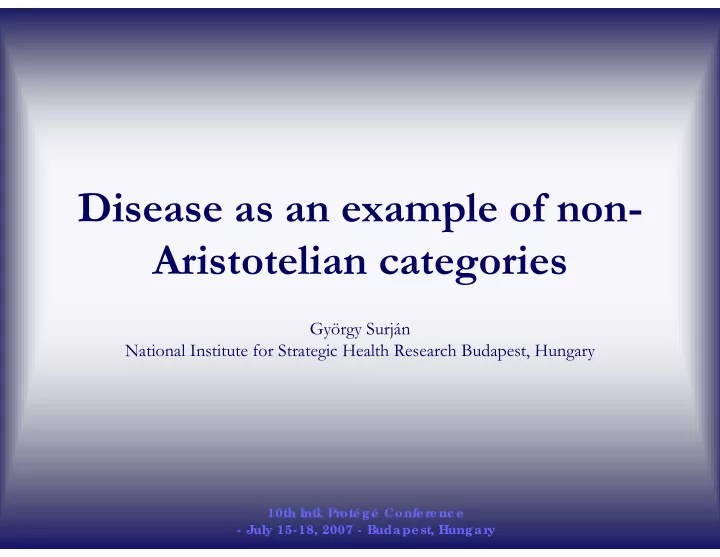

Disease as an example of non- Aristotelian categories György Surján National Institute for Strategic Health Research Budapest, Hungary 10th Intl. Pr oté gé Confe r e nc e - July 15-18, 2007 - Budapest, Hungar y
What is non-Aristotelian? Aristotelian principles Aristotelian principles • All statements must be either true or false. • No statements can be true AND false at the same time. • There is nothing in between true and false. 10th Intl. Pr oté gé Confe r e nc e - July 15-18, 2007 - Budapest, Hungar y
Fuzzy logic is often mentioned as non-Aristotelian • In fuzzy logic there are truth values between the absolute true (1) and absolute false (0). E.g. "I am a talented man" • But fuzzy statements can be converted into two valued logic using membership functions: "Is it true, that my membership function in 'talented man' is 0,2?" (Yes or No answer) 10th Intl. Pr oté gé Confe r e nc e - July 15-18, 2007 - Budapest, Hungar y
Non-Aristotelian categories lack common exclusive properties • Bio-medical categories often non-Aristotelian (there is nothing that is true for all and only instances of the given category) • Disease is a typical example (some are painful, but not all painful conditions are diseases, etc.) 10th Intl. Pr oté gé Confe r e nc e - July 15-18, 2007 - Budapest, Hungar y
What is 'Disease' • Without having a common exclusive property, people can agree for the most part what is a disease and what isn't. • This means that sometimes they disagree. • The level of agreement depends on the similarity of the social/cultural background of people. 10th Intl. Pr oté gé Confe r e nc e - July 15-18, 2007 - Budapest, Hungar y
Socio-cultural dependence • Example of homo-sexuality: sin, disease, normal variation; corresponds to punishment, treatment, tolerance. • Being something a disease depends on reaction of the society. • Possible main reaction types to disease: separation, treatment (consider leprosy in ancient times) 10th Intl. Pr oté gé Confe r e nc e - July 15-18, 2007 - Budapest, Hungar y
Proposed definition Anything is a disease that in a given society has the potential to provoke some specific (health) action against itself. •The action not necessarily happens in each case •This is not an intrinsic property. 10th Intl. Pr oté gé Confe r e nc e - July 15-18, 2007 - Budapest, Hungar y
Disease as hybrid class • What 'conditions' can satisfy the definitions? – Continuants (Endurants)? – Occurrents (Perdurants)? • Diseases can be seen as 'hybrid' categories. (Process and morphology dominated diseases) • No single disease is thought to be an occurrent AND a continuant at the same time 10th Intl. Pr oté gé Confe r e nc e - July 15-18, 2007 - Budapest, Hungar y
Alignment with top level ontologies • BFO and DOLCE were tested • Endurants and Perdurants are disjoint • 'Quality' in DOLCE is neither endurant nor perdurant. • Disease must be represented as a union of E- disease and P-disease 10th Intl. Pr oté gé Confe r e nc e - July 15-18, 2007 - Budapest, Hungar y
Limitation of description logic To represent social dependency requires first order logic: provokes (disease, action, society) 10th Intl. Pr oté gé Confe r e nc e - July 15-18, 2007 - Budapest, Hungar y
Conclusions • There is no common exclusive property for disease. • Conditions used to be regarded as disease are ontologically heterogeneous. • If social dependency has to be represented, DL is insufficient, FOL is required. 10th Intl. Pr oté gé Confe r e nc e - July 15-18, 2007 - Budapest, Hungar y
Thank you for attention ! 10th Intl. Pr oté gé Confe r e nc e - July 15-18, 2007 - Budapest, Hungar y
Recommend
More recommend